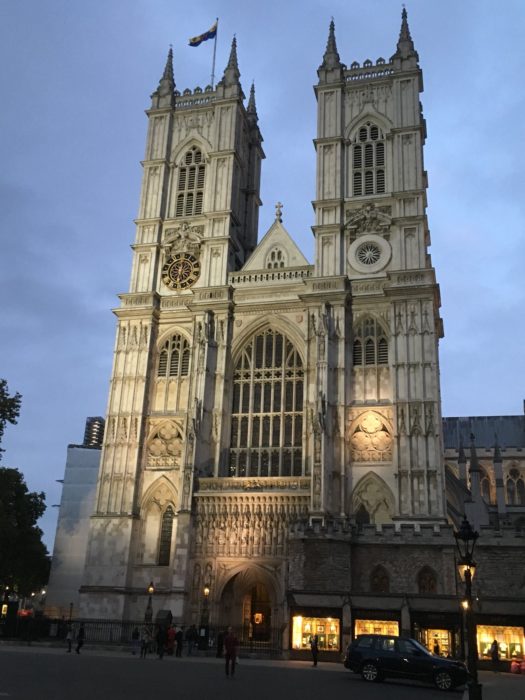7th August 2019 London,UK
The Westminster Abbey Institute Fellows’ Programme

The splendid Gothic structure of Westminster Abbey dominates the southern side of Parliament Square. The nineteenth-century reconstruction by Charles Barry of the Palace of Westminster, home of the houses of parliament, continues the Gothic theme along its eastern side. There is another point of commonality which unites the neighbours around the square: public service. To the power of the church to the south of the square and that of politicians to the east are joined judicial power, represented by the Supreme Court of the United Kingdom, on the west side of the square, and that of the civil service in the government ministries, like my home, the Foreign and Commonwealth Office, running alongside Whitehall to the north.
The juxtaposition of public service institutions around Parliament Square provides the inspiration for the Westminster Abbey Institute, established with the aim of revitalising moral values in public life. The Institute draws on the model of St Paul’s Institute, which encourages financial institutions to think about the role of morality and ethics in the economy. The institutes of these great places of worship explore then the moral dimension of the constituencies which form their immediate neighbours.
Another characteristic of Westminster Abbey is important in its engagement with public service. Its origins as a Benedictine monastery, following the Rule established by the sixth-century saint, Benedict of Nursia, as a guide for monastic communities. The Institute explores the lessons for public servants arising from the values established by St Benedict. These provide a counterpoise to a focus on individual attainment by exploring the role of the community. The hallmarks of a Benedictine education include stability and stewardship. For the public servant the emphasis here is less on personal achievement than on playing one’s part in moving the organisation forward in a positive way, respectful of its traditions but mindful of the need to develop it. We appear “in medias res”: in the middle of the plot. And we don’t live to find out how it ends. Others have gone before us. Others will come after us. All must play our part, though none of us fully understands our contribution.
Every year, the Westminster Abbey Institute runs a fellows’ programme for up to twenty public servants nominated from a wide range of organisations, including parliament, the civil service, the armed forces, media, law and teaching. I was delighted to have been nominated by the FCO, I think the first participant in the scheme from my organisation.
As public servants, looking to do the right thing in our jobs, the obvious question arises as to what exactly the “right thing” is. That was the theme of the first residential seminar of the fellowship programme, held in the tranquil surrounds of the Royal Foundation of St Katharine, Limehouse, founded in 1147 by Queen Matilda as a religious community and hospital for the poor and infirm.
Claire Foster-Gilbert, the inspirational director of the institute, argued that this process of working out how to do the “right thing” could take one of three forms. The first is a goal-based morality: something is right if more people are benefitted than harmed. This is the utilitarianism of Jeremy Bentham: the greatest good for the greatest number. The problem here is that, taken to extremes, this can lead to outcomes which don’t feel, well, moral: if one person must suffer so several can thrive, the utilitarian would say “so be it.”
Thus the second approach, duty-based morality, which is concerned less about the results of an action than by whether the performance of it conforms to a set of moral principles. But such duty-based morality pays no attention to the views of those affected by the action. It is summed up by the phrase “doctor’s orders”: a view that the expert should deliver what their professional experience tells them is right for the patient or student, irrespective of whatever the latter thinks about the matter.
The response to this is the third approach, right-based morality, which argues that the views of those affected by the action are paramount. The increasing attention paid to patient consent in healthcare decisions is a good example.
Claire argues that each of these approaches has its advantages and disadvantages: that what the public servant needs to do is to find the right balance between them such that this three-legged stool of moralities doesn’t wobble.
The fellows’ programme passed quickly, with valuable opportunities to hear from senior figures in public life on how issues of morality and ethics had influenced their decision-making, the generous time of a mentor drawn from the highest ranks of public service, and visits to the National Portrait Gallery and Crick Institute.
For the final residential weekend of the programme we headed to Launde Abbey in the East Midlands, a place so nice that Thomas Cromwell kept it for himself when orchestrating the dissolution of the monasteries. His son Gregory is buried in the chapel. The focus of discussions moved from moral analysis to moral practice, taking inspiration from the work of US academic Joseph Campbell, whose Hero With a Thousand Faces demonstrated that the journey traced by the archetypal hero is remarkably consistent across all of the world’s mythologies. It works for film scripts too, from Gandhi to Star Wars.

The figure taking that journey, our hero, is called out of the ordinary world in which they live. They refuse the call. A mentor knows that the hero has what it takes within them to answer the call. The hero takes the decision to cross the threshold. There is no turning back. There are numerous trials. Allies and enemies become clear. The way forward is dark. A great ordeal looms – the bloody battle near the end of the film. There is a prize, though this is typically received by others. The ordinary world has changed, as has the hero: a new level of life is attained. The process may then repeat, or as Henry Kissinger put it, “each success only brings an admission ticket to a more difficult problem.”
The return from Launde Abbey involved a taxi to the railway station at Oakham, the capital of Rutland, a county which has always had a rather mystical image for me, a legacy perhaps of Rutland Weekend Television and the Beatles pastiches of The Rutles, as well as of its administrative absence for two decades while subsumed into Leicestershire. I arrived at Oakham early for my train, and had a short walk into the town, passing the picturesque house of Sir Jeffrey Hudson, the “smallest man from the smallest county in England”, whose short stature meant both that he was treated quite outrageously but was also the source of opportunity in a lifetime in which his fortunes oscillated wildly. Served up in a pie to the English Queen Henrietta Maria of France, for whom he became court dwarf; expelled from court following a duel; capture by Barbary pirates; rescue; imprisonment in London as a Catholic during a time of religious persecution. How did his hero’s journey feel?
One of the books on the fellows’ programme reading list was David Brooks’ The Road to Character. Brooks argues that we spend our lives focusing on our resume virtues, oriented towards career success, personal ambition and high status. We spend too little time thinking about our eulogy virtues: the ones that get talked about at our funeral. These build our inner character. While the former is about personal achievement, the latter is about service. There are echoes here of St Benedict’s Rule, and of the stewardship role of public servants.
If this role of ensuring good stewardship of the organisation has been underplayed in our focus on personal ambition, this does not mean that the organisation should be chained to the principles of its founders. Organisations must change, while remaining true to the values of public service. They must reflect, reinforce and enable positive change in society. One of our speakers, Peter Hennessy, argued that for the post-Second World War generation of British public servants, there were a number of remarkably consistent flags. The Beveridge Report and the foundation of the welfare state, especially the National Health Service. Decolonisation and the creation of the Commonwealth. The establishment of the United Nations, NATO and the Bretton Woods institutions. What, he asked, were the flags of the current generation of public servants?
It is a good question. I think the list would include diversity and inclusion. I joined the Foreign and Commonwealth Office in 1987. It was not many years earlier that women had been obliged to resign as diplomats on marriage. The recruitment literature still informed us that homosexuality was a bar to membership of the Diplomatic Service. Much has changed for the better, and the process of changing it is one of the flags for this generation of public servants. The title of the department in which I work in the FCO, “Soft Power and External Affairs”, is less than two years old. In its focus on the attributes of the United Kingdom which are internationally attractive it forms part of a wider flag, also summed up as “Global Britain”, which is about ensuring that our country remains outward looking and engaged in a world in which challenges are increasingly global in nature and in which actors from civil society organisations to businesses to cities increasingly operate with a global frame of reference.
We are “in medias res”, but surely our role is not just, as folk singer Roy Harper put it in a 1970s lyric, to “leave this world as clean as when you came.” Rather, through our work as morally aware stewards within our public service institutions, it is to try to clean it up a little bit more.